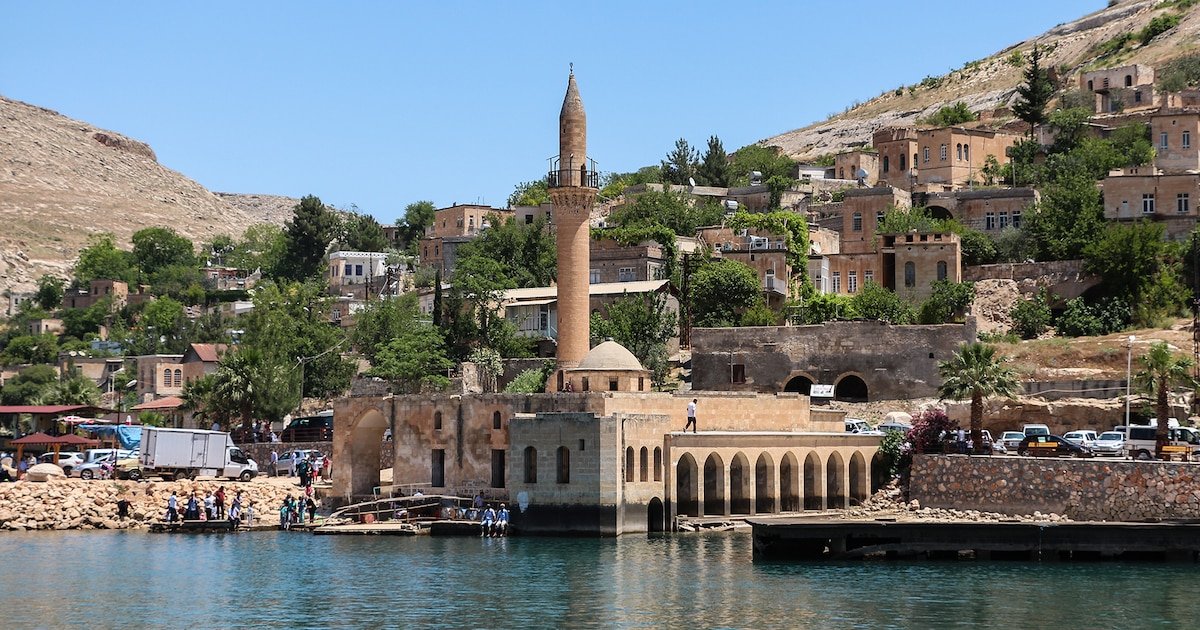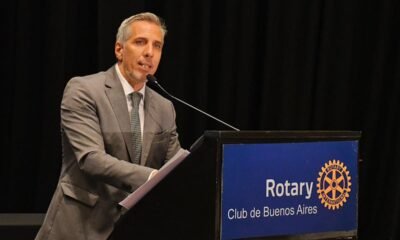INTERNACIONAL
Rosas negras y ruinas sumergidas: así es Halfeti, la ciudad escondida en el Éufrates que resurgió entre el mito y la modernidad

En el sureste de Turquía, a orillas del legendario río Éufrates, una ciudad emerge parcialmente de las aguas, envuelta en misterio y leyendas.
Halfeti, conocida como la “ciudad sumergida”, tuvo que transformar radicalmente su fisionomía tras quedar parcialmente bajo el agua por la construcción de la presa de Birecik, en el año 2000.
Actualmente, este enclave no solo atrae a visitantes por su singular paisaje y arquitectura sumergida, sino que también fascina al mundo con el enigma de sus famosas “rosas negras“, flores que han dado lugar a mitos, debates científicos y un renovado sentido de identidad local, según reportó CNN Travel.

A principios del nuevo milenio, la construcción de la presa de Birecik, una estructura de 60 metros de altura y 2,4 kilómetros de ancho, provocó la inundación de dos pueblos y diez aldeas en la provincia de Sanliurfa.
Según consignan medios locales, alrededor del 40% de Halfeti, que contaba con unos 2.600 habitantes, quedó sumergido bajo las aguas. Entre las edificaciones perdidas se encontraban numerosas casas de piedra, comercios y una parte significativa de la Merkez Camii, la mezquita central del siglo XIX.
La presa de Birecik forma parte de un ambicioso plan de desarrollo para el sureste de Anatolia, que incluye varias de estas estructuras a lo largo de los ríos Éufrates y Tigris. Su embalse, de 52 kilómetros cuadrados, se diseñó para regar 70.000 hectáreas de tierras agrícolas y generar unos 2.500 GWh de electricidad al año, suficiente para abastecer a casi un millón de hogares turcos.

Sin embargo, el impacto en la población local fue profundo y, en muchos casos, doloroso. Más de 6.000 personas tuvieron que ser reubicadas, y la comunidad perdió parte de su patrimonio tangible e intangible. Erhan Yildirim, investigador local, historiador y guía profesional, expresó a CNN Travel: “No se puede recuperar la cultura; la cultura permanece bajo el agua”.
Antes de la inundación, la economía de esta población era, básicamente, agropecuaria, con una reputación especial por la producción de pistachos. Muslum Karaman, operador de barco local, relató a CNN Travel que “la gente de Halfeti solía ganarse la vida con la cría de ganado y la agricultura”. Sin embargo, la llegada de la presa y la consiguiente transformación del entorno los obligaron a buscar nuevas formas de subsistencia.
Karaman explicó que la ciudad “ha cambiado completamente hacia el turismo“, y que muchos habitantes han adaptado sus viviendas para convertirlas en restaurantes, boutique y cafeterías. Esta reinvención económica le permitió a la comunidad mejorar su calidad de vida y aprovechar el creciente interés de los visitantes por la singularidad de Halfeti.

En la actualidad, Halfeti se posiciona como un destino turístico singular. Los visitantes llegan atraídos por la posibilidad de recorrer en barco, moto acuática o flyboard la arquitectura sumergida de la ciudad antigua.
El buceo se ha convertido en una de las actividades favoritas, impulsada por la apneísta turca Şahika Ercümen, quien en 2020 realizó una inmersión en Halfeti para sensibilizar sobre la contaminación por plásticos.
Además de la arquitectura sumergida, los turistas pueden realizar excursiones en barco hasta la fortaleza de Rumkale, situada a orillas del Éufrates. Este sitio histórico, cuyos cimientos datan del Imperio bizantino, permite a los visitantes explorar restos de fortificaciones armenias y conocer la compleja historia de la región, marcada por el paso de diferentes civilizaciones.

Uno de los mayores atractivos de Halfeti es el misterio de sus “rosas negras“, flores que han dado lugar a leyendas y debates científicos. Según la tradición local, es el único lugar del mundo donde florecen.
Yildirim sostiene que “si cultivas la rosa negra en cualquier otro lugar, nunca te dará el mismo color”. No obstante, expertos internacionales cuestionan su existencia. Michael Marriott, reconocido especialista floricultura, declaró a CNN Travel: “No creo que ninguna de las llamadas flores negras sea realmente negra”.
Por otra parte, Guy Barter, horticultor jefe de la Royal Horticultural Society del Reino Unido, coincide en que “las rosas negras, y en general las flores negras, rara vez son completamente negras, si no de un granate muy intenso o, como en este caso, de un rojo muy oscuro”.
El color oscuro de las rosas de Halfeti se atribuye a las condiciones únicas del suelo y el clima de la región. Marriott sugiere que los agricultores locales podrían estar utilizando raíces originales de las rosas, capaces de prosperar en suelos más ácidos, lo que oscurece los pétalos. Birsen Aşağı, vendedora local, atribuye el fenómeno a las “condiciones climáticas de aquí”.

A pesar de las dudas sobre su autenticidad, las rosas negras de Halfeti han adquirido fama internacional. Marcas como la perfumista británica Penhaligon’s han lanzado fragancias inspiradas en la flor, y los productos derivados se han convertido en un símbolo de la ciudad.
Las leyendas locales enriquecen el mito de la rosa negra. Una de ellas narra la historia de Adir, un arquitecto que construyó la mezquita de la ciudad, y su nieta Vartuhi, quien cultivaba las rosas más hermosas.
Vartuhi se enamoró de Firat, un huérfano del otro lado del río, pero su amor fue prohibido. Desesperados, ambos se arrojaron al Éufrates y, desde entonces, las rosas de Halfeti florecen negras en señal de luto.
Otra versión, relatada por Yildirim, atribuye la flor al Diablo, quien, tras el asesinato de una niña inocente, decretó que la rosa negra solo florecería en el lugar de su muerte, como símbolo de dolor y venganza.

A pocos kilómetros del pueblo, la fortaleza de Rumkale se alza como testigo de la historia milenaria de la región. Según CNN Travel, sus cimientos datan del Imperio bizantino, entre los siglos V y VI, aunque existen indicios de estructuras anteriores.
Durante los siglos XII y XIII, la fortaleza fue residencia del Catholicós, líder espiritual de la Iglesia armenia, y posteriormente cayó en manos de los mamelucos en 1292, antes de pasar al control del Imperio Otomano. La arquitectura de Rumkale, visible desde el río, recuerda la compleja y a menudo turbulenta historia de Anatolia, marcada por el cruce de culturas y religiones.
En 2013, Halfeti fue reconocida como parte de la red Cittaslow, un movimiento internacional que promueve la calidad de vida y la preservación de la cultura local.
INTERNACIONAL
US deploys Ford carrier strike group to combat narco-terror in Western Hemisphere

NEWYou can now listen to Fox News articles!
The Trump administration has ordered the deployment of the Gerald R. Ford Carrier Strike Group in the Western Hemisphere as the U.S. continues to target suspected drug smuggling vessels in the Caribbean.
«In support of the President’s directive to dismantle Transnational Criminal Organizations (TCOs) and counter narco-terrorism in defense of the Homeland, the Secretary of War has directed the Gerald R. Ford Carrier Strike Group and embarked carrier air wing to the U.S. Southern Command (USSOUTHCOM) area of responsibility (AOR),» chief Pentagon Spokesman Sean Parnell said in a statement Friday.
«The enhanced U.S. force presence in the USSOUTHCOM AOR will bolster U.S. capacity to detect, monitor, and disrupt illicit actors and activities that compromise the safety and prosperity of the United States homeland and our security in the Western Hemisphere,» he added. «These forces will enhance and augment existing capabilities to disrupt narcotics trafficking and degrade and dismantle TCOs.»
The Trump administration has ordered a number of strikes in the Caribbean aimed at dismatling and disrupting drug cartels in the region.
Most recently, War Secretary Pete Hegseth announced on Thursday that a strike on a vessel allegedly operated by members of Tren de Aragua (TdA), a Designated Terrorist Organization (DTO), killed six alleged narco-terrorists.
This story is breaking. Please check back for updates.
military
INTERNACIONAL
La neurociencia revela cómo se forman y modifican los hábitos

La neurociencia ha demostrado que los hábitos, esos comportamientos automáticos que moldean la rutina diaria y repercuten en la salud mental, surgen de la interacción entre dos sistemas cerebrales: uno responsable de responder a estímulos y otro orientado por metas y creencias.
Esta perspectiva, presentada mediante un estudio publicado en enero de 2025 por investigadores del Trinity College Dublin, está transformando la comprensión sobre la formación y modificación de los hábitos, con efectos directos en la vida cotidiana y en el tratamiento de trastornos compulsivos.
Eike Buabang y su equipo destacan el denominado marco de doble sistema. Este concepto, respaldado por la neurociencia cognitiva, sostiene que los hábitos resultan del equilibrio entre un sistema de control dirigido por objetivos —basado en la evaluación consciente de acciones y resultados— y un sistema estímulo-respuesta, que automatiza conductas frente a señales familiares.
Cuando el sistema estímulo-respuesta domina, las personas tienden a repetir acciones sin analizar su relación con metas actuales, lo que puede derivar en errores, impulsividad o conductas compulsivas. Como señalan Buabang y sus colegas: “Los hábitos pueden entenderse como un balance entre un sistema impulsado por estímulos, basado en asociaciones estímulo-respuesta, y un sistema dirigido por objetivos, basado en expectativas acción-resultado y metas valoradas”.

La formación de hábitos responde a varios mecanismos clave. Destaca la repetición, ya que cada vez que una conducta se repite en un contexto similar, las conexiones neuronales entre estímulo y respuesta se refuerzan, facilitando su automatización. No obstante, el estudio muestra que la evidencia es dispar sobre cuántas repeticiones se requieren: algunos trabajos sitúan el rango entre 18 y 254 días, según el tipo de hábito y características de la persona.
El refuerzo —la obtención de consecuencias positivas tras la acción— fortalece los hábitos, gracias en parte a la dopamina en regiones cerebrales como el putamen posterior. Además, cuando se desactivan los procesos dirigidos por objetivos, por presión de tiempo, estrés o distracción, el sistema estímulo-respuesta asume el control. La estabilidad del contexto favorece la consolidación de los hábitos, ya que la repetición en entornos previsibles disminuye la necesidad de supervisión consciente y permite que las acciones se encadenen de modo automático.
Existen diferencias individuales y neurobiológicas que influyen en la facilidad para formar o interrumpir hábitos. La estructura y actividad de circuitos como el putamen y la corteza prefrontal dorsolateral varían entre personas, lo que explica por qué algunos adquieren hábitos con rapidez mientras que otros precisan más tiempo o repeticiones. Además, la intensidad de las señales contextuales, la frecuencia de repetición y la motivación —tanto intrínseca como extrínseca— modulan este proceso. Según la investigación: “La duración necesaria para formar un hábito varía considerablemente entre individuos”, lo que resalta la importancia de personalizar las estrategias de intervención.
Romper hábitos arraigados requiere debilitar las asociaciones estímulo-respuesta, evitar los estímulos desencadenantes, potenciar la inhibición dirigida por objetivos y, en muchos casos, crear hábitos alternativos que compitan con los anteriores. La extinción de un hábito no elimina las conexiones previas, sino que genera una nueva asociación entre el contexto y la ausencia de respuesta, lo que explica la propensión a recaer frente a los estímulos originales.
Estrategias como la evitación de contextos problemáticos, el entrenamiento en inhibición y la formación de intenciones de implementación (“si ocurre X, haré Y”) presentan eficacia tanto en entornos experimentales como en la vida cotidiana. Estas técnicas operan en terapias conductuales y farmacológicas, y pueden potenciarse mediante intervenciones como la estimulación cerebral no invasiva, que refuerza el control ejecutivo.

Las aplicaciones clínicas de estos avances resultan especialmente relevantes en trastornos compulsivos, como el trastorno obsesivo-compulsivo (TOC), las adicciones y los trastornos alimentarios. En estos casos, se identifica un déficit en el control dirigido por objetivos, lo que favorece la aparición de hábitos patológicos. Como advierte la investigación: “El trastorno obsesivo-compulsivo, el trastorno por consumo de sustancias y los trastornos alimentarios están vinculados a déficits en el control dirigido por objetivos, posiblemente explicados por una dimensión transdiagnóstica de compulsividad”.
Las terapias más eficaces combinan la exposición a los estímulos desencadenantes, la prevención de la respuesta habitual y el refuerzo de conductas alternativas, lo que permite abordar tanto mecanismos automáticos como procesos conscientes.
A pesar de estos avances, la investigación actual enfrenta desafíos metodológicos y conceptuales. Persisten dificultades para replicar hallazgos clave en humanos y continúa el debate sobre la suficiencia del modelo de doble sistema. Buabang y sus colegas proponen modelos más complejos, integrando la interacción dinámica entre hábitos de pensamiento, creencias automáticas y conductas. La transferencia de hábitos entre contextos y la resistencia al cambio figuran como áreas de estudio aún en desarrollo.
Hacia el futuro, la investigación subraya la importancia de profundizar en los mecanismos subyacentes a la formación y alteración de hábitos, así como adaptar las intervenciones a las distintas características individuales y contextuales. Solo mediante una comprensión más precisa de estos procesos será posible diseñar estrategias realmente eficaces para promover cambios conductuales duraderos y mejorar el abordaje de trastornos relacionados con la compulsividad.
deporte,running,mujeres,parque,ejercicio,vida saludable,mañana,ciudad,bienestar,actividad física
INTERNACIONAL
New York Attorney General Letitia James enters plea in federal mortgage fraud case

NEWYou can now listen to Fox News articles!
New York Attorney General Letitia James was arraigned at a federal court in Norfolk, Virginia, Friday, where she pleaded not guilty to two felony charges of bank fraud and making false statements to a financial institution.
The charges against James stem from her 2020 purchase of a home in Norfolk, Virginia. Prosecutors allege that James misled a bank about the nature of the residence in order to obtain more favorable loan conditions.
The indictment states that James misrepresented the financial institution in claiming it would be her secondary residence, and instead rented it out to a family.
According to the indictment, the lower interest rate would allow James to save nearly $19,000 over the course of the 30-year loan.
LETITIA JAMES TO BE ARRAIGNED IN VIRGINIA ON FEDERAL BANK FRAUD CHARGES TIED TO 2020 HOME PURCHASE
NY AG Letitia James and President Donald Trump (Getty Images)
James entered the not guilty plea herself to U.S. District Judge Jamar K. Walker.
She is being represented in the case by defense attorney Abbe Lowell, and by Andrew Bosse, a former assistant U.S. attorney based in Norfolk who formerly headed up the office’s criminal division.
James’ arraignment is the latest in a string of prosecutions brought against the president’s perceived political foes, despite objections from career prosecutors — some of whom have since been fired or resigned.
James, a Democrat, has long-drawn Trump’s ire after she campaigned for attorney general in 2016 largely on vows to investigate Trump’s actions and businesses.
She also successfully secured a $450 million civil fraud case against him last year, though an appeals court later tossed the financial penalty portion of the case.
«This is nothing more than a continuation of the president’s desperate weaponization of our justice system,» James said in a statement after she was indicted.
DOJ SEEKS REMOVAL OF COMEY’S DEFENSE LAWYER, CITING CONFLICT OF INTEREST

Trump denies B1 bombers flew toward Venezuela amid cartel threats. (AP Photo/Alex Brandon)
«These charges are baseless, and the president’s own public statements make clear that his only goal is political retribution at any cost,» she added.
Her indictment, like the indictment of former FBI Director James Comey, was presented to a grand jury by former White House aide Lindsey Halligan, whom President Donald Trump installed as the acting U.S. attorney for the Eastern District of Virginia last month.
Trump, in September, said he would install Halligan as the top prosecutor for the Eastern District of Virginia, replacing interim attorney Erik Siebert, who resigned under pressure to indict both Comey and James.
«No one is above the law. The charges as alleged in this case represent intentional, criminal acts and tremendous breaches of the public’s trust,» Halligan said in a statement. «The facts and the law in this case are clear, and we will continue following them to ensure that justice is served.»
After the arraignment, it is likely that she will file a motion to dismiss her case for vindictive and selective prosecution, following similar steps taken by Comey’s legal team in Alexandria earlier this week.
She will also file a motion to dismiss her case based on what her lawyers will argue was the unlawful appointment of Halligan in securing her indictment.
CLICK HERE TO GET THE FOX NEWS APP
Lowell, her attorney, has described the case against her as «improper political retribution,» and vowed they would «fight these charges in every process allowed in the law.»
The Justice Department did not immediately respond to Fox News’s request for comment on the case, or whether Halligan or Keller would be joined by any other federal prosecutors in the Eastern District of Virginia.
Speaking to reporters outside the court on Friday, James said the Justice Department is being used as a tool of «revenge,» and a «vehicle of retribution.»
«But my faith is strong,» she told the group that had massed outside the courthouse in Norfolk, Virginia, hours earlier. «I have a belief in the justice system.»
«Never cow down or break or bend. So there is no fear today,» she said. «I will not be deterred.»
Judge Walker set a trial date for Jan. 26, 2026, and ordered parties to appear back in court for motions hearings in early December.
politics,new york,federal courts,donald trump,crime world,virginia

 CHIMENTOS2 días ago
CHIMENTOS2 días agoAdabel Guerrero confesó de qué famosa está enamorada y que le encantaría tener relaciones: «La China Suárez me sorprendió con su belleza»

 DEPORTE2 días ago
DEPORTE2 días agoUniversidad de Chile vs. Lanús, por la Copa Sudamericana: día, horario y cómo verlo por TV

 POLITICA2 días ago
POLITICA2 días agoDiego Luciani, sobre la condena a Cristina Kirchner: “No hay sentencia ejemplar sin recuperar lo robado”













